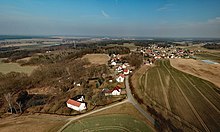Horka (Crostwitz)
|
Horka
Hórki community Crostwitz
Coordinates: 51 ° 15 ′ 46 ″ N , 14 ° 15 ′ 14 ″ E
|
|
|---|---|
| Height : | 169 m |
| Residents : | 247 (December 31, 2016) |
| Incorporation : | 1st January 1974 |
| Postal code : | 01920 |
| Area code : | 035796 |
|
Town view from the south
|
|
Horka , Upper Sorbian , is a village in the center of the East Saxon district of Bautzen , which has been part of the Crostwitz community since 1974 . It has 262 inhabitants and is part of the Sorbian settlement area . Most of the population speaks Sorbian as their mother tongue.
The German place name is derived from the original Sorbian name, which means something like "several hills" ( hórka = hill) and refers to the location of the place.
geography
Horka is located about 18 kilometers northwest of Bautzen and 12 kilometers east of Kamenz between 165 and 185 m above sea level. NN. The neighboring towns are Doberschütz in the northeast, Jeßnitz in the southeast, Crostwitz in the south and Neudörfel in the west. Horka is surrounded by hills up to 200 meters high in the headwaters of the Doberschützer Bach , a small tributary of the Black Elster .
To the north and east of the village are smaller forests; on the hill that borders Horka to the west, a large quarry residual hole reminds of the granite quarrying near the place. Today the quarry is a popular bathing place as well as the home water of a diving school located here . There are five other, smaller remaining holes in the area.
After the settlement, Horka is a relaxed square village .
history
The place was probably first mentioned in the second half of the 14th century as Hannos Harke , although the assignment here is controversial. In the 17th and 18th centuries the manor was at the Räckelwitz manor .
Until January 1, 1974, Horka was an independent rural community, then it was incorporated into Crostwitz.
population
For his statistics on the Sorbian population in Upper Lusatia, Arnošt Muka determined a population of 230 inhabitants for the place in the 1880s; 226 of them were Sorbs (98%) and four Germans Ernst Tschernik had a Sorbian-speaking population of 89.2% in 1956.
In 1890 Horka had 202 inhabitants, the same as 60 years earlier. By the 1960s the number rose to around 300, only to decrease slightly after 1990.
The inhabitants are traditionally almost exclusively of the Catholic denomination; the place has been parish to Crostwitz since ancient times . The Protestant part belongs to the Schmeckwitz parish .
Economy and Infrastructure
Horka is located a little east of the well-developed state road 101 ( Königswartha - A 4 ) on the local roads from Neudörfel and Crostwitz to Doberschütz . The next junction of the A 4 ( Uhyst am Taucher ) is eight kilometers away.
In 1951 the first sports unit - the "SG Granit Horka" - was founded in Horka. In 1960 the new sports field north of the village in the direction of Doberschütz was inaugurated. In 1975 SG Horka and BSG Traktor Ralbitz merged. Since 1993 the club has been called DJK “Sokoł” Ralbitz-Horka and is based in Ralbitz. However, the Horkaer Platz is still used.
Personalities
- Jakob Jatzwauk ( Jakub Wjacławk ; 1885–1951), librarian and Slavist
- Jurij Chěžka (1917–1944), Sorbian poet. A memorial plaque in the village reminds of him.
- Jan Wornar (1934–1999), Sorbian writer
- Jurij Koch (* 1936), Sorbian writer. Horka is the setting for his novel Na kóncu dnja ("At the end of the day"), which takes place here in 1794.
Web links
swell
- Horka in the Digital Historical Directory of Saxony
- ↑ Information for 2014 from am-klosterwasser.de
- ↑ Ernst Tschernik: The development of the Sorbian population . Akademie-Verlag, Berlin 1954, p. 97 .
- ^ Ludwig Elle: Language policy in the Lausitz . Domowina-Verlag, Bautzen 1995, p. 251 .



